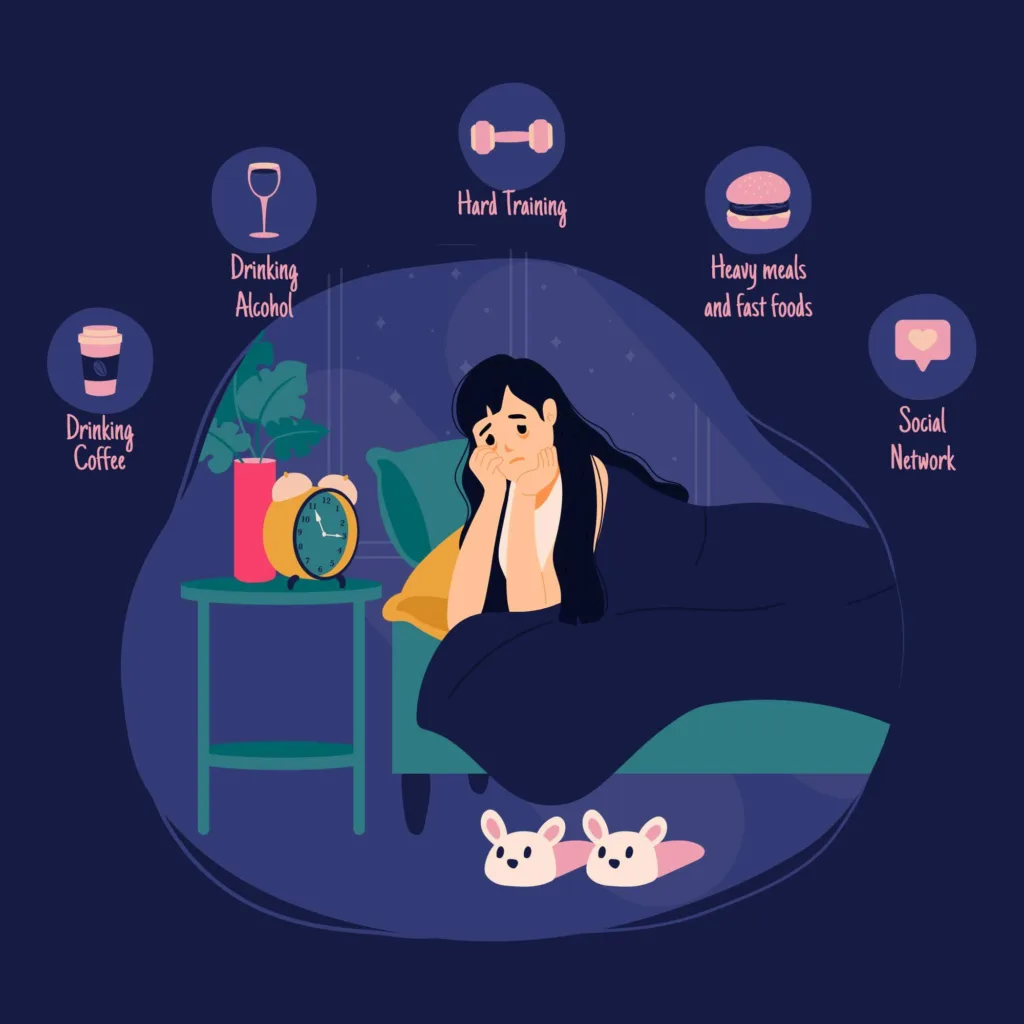How To sleep fast in 5 minutes, practice deep breathing and progressive muscle relaxation. Create a dark, quiet, and cool sleeping environment.
Falling asleep quickly can be challenging. Stress, screens, and daily routines often disrupt sleep patterns. Deep breathing exercises calm the mind and body, promoting relaxation. Progressive muscle relaxation involves tensing and relaxing each muscle group, which reduces physical tension. A dark, quiet, and cool environment signals the brain it’s time to sleep.
Reducing screen time before bed minimizes blue light exposure, which can delay sleep. Consistent bedtime routines also help train the body to fall asleep faster. Implementing these strategies can improve sleep quality and help you fall asleep in as little as 5 minutes.
Introduction To Speedy Slumber
Falling asleep quickly can be challenging. Many struggle with tossing and turning. Speedy slumber techniques can help. This guide will show you ways to sleep fast. Discover how to drift off in just 5 minutes.
Why Quick Sleep Matters
Quick sleep is essential for health. It boosts mood and focus. Falling asleep fast can lead to better rest. Good rest improves daily performance. For many, sleep is a struggle. Quick sleep helps make the most of nightly rest.
The Challenge Of Instant Rest
Instant rest is hard for many. Stress and screens can keep you awake. The mind races, and sleep seems distant. Speedy slumber techniques can help calm the mind. Learning these skills can bring quick and restful sleep.
- Practice deep breathing.
- Limit screen time before bed.
- Maintain a cool room temperature.
Deep breathing can relax the body. Limiting screens reduces blue light exposure. A cool room can signal the body to sleep. These steps can make a big difference.
| Technique | Benefit |
|---|---|
| Deep Breathing | Relaxes the body |
| Limit Screens | Reduces blue light |
| Cool Room | Encourages sleep |
Use these tips for better sleep. Quick sleep can improve your life. Start tonight and enjoy restful nights.
:max_bytes(150000):strip_icc()/could-falling-asleep-too-fast-be-a-sleep-problem-3015146_V2-13d637b9535e49e5bcd7fed53728dc6f.png)
Credit: www.verywellhealth.com
Pre-sleep Rituals For Rapid Rest
Struggling to fall asleep quickly? Pre-sleep rituals can help you sleep fast. These rituals prepare your body and mind for rest. Follow these simple steps to create a perfect sleep routine.
Creating A Calming Environment
A calm environment is key for quick sleep. Here are some tips:
- Dim the lights an hour before bed.
- Keep your room cool and comfortable.
- Remove any noise distractions.
- Use blackout curtains to block light.
You can also add calming scents. Use lavender or chamomile essential oils. These scents relax your mind and help you drift off faster.
The Power Of Routine
A consistent routine signals your body it’s time to sleep. Follow these steps:
- Go to bed at the same time every night.
- Engage in a quiet activity like reading.
- Avoid screens at least 30 minutes before bed.
- Practice deep breathing or meditation.
Your body will get used to this routine. Soon, you’ll fall asleep faster and wake up refreshed.
Dietary Tips For Faster Sleep
Getting a good night’s sleep is essential for health and well-being. Many people struggle to fall asleep quickly. Making some simple changes to your diet can help. Below are some dietary tips to help you sleep faster.
Foods To Embrace
Some foods can help you fall asleep faster. They contain nutrients that promote sleep.
- Almonds: Rich in magnesium, they help relax your muscles.
- Bananas: High in potassium and magnesium, which help relax your muscles.
- Turkey: Contains tryptophan, which helps produce melatonin.
- Chamomile Tea: Contains antioxidants that help improve sleep quality.
- Kiwi: Rich in serotonin, which helps regulate sleep.
Foods To Avoid
Some foods can make it hard to fall asleep. Avoid these foods before bedtime.
- Caffeine: Found in coffee, tea, and soda. It keeps you awake.
- Spicy Foods: Can cause heartburn and disrupt sleep.
- Alcohol: May help you fall asleep but disrupts sleep later.
- High-Sugar Foods: Cause blood sugar spikes and crashes, affecting sleep.
- Heavy Meals: Can cause discomfort and indigestion, making it hard to sleep.
Mindfulness And Relaxation Techniques
Struggling to fall asleep quickly can be frustrating. Mindfulness and relaxation techniques can help you fall asleep in just 5 minutes. These methods calm your mind and body, promoting swift and restful sleep.
Breathing Exercises
Deep breathing exercises can reduce stress and prepare your body for sleep.
- 4-7-8 Breathing Technique: Inhale for 4 seconds, hold your breath for 7 seconds, then exhale for 8 seconds. Repeat until you feel relaxed.
- Box Breathing: Inhale for 4 seconds, hold for 4 seconds, exhale for 4 seconds, and hold again for 4 seconds. Continue this cycle to calm your mind.
Progressive Muscle Relaxation
Progressive Muscle Relaxation involves tensing and then relaxing each muscle group.
- Start with your toes. Tense them for 5 seconds, then release.
- Move to your calves. Tense and release.
- Continue up your body: thighs, abdomen, chest, arms, and face.
This process helps release physical tension, making it easier to fall asleep.
| Technique | Steps |
|---|---|
| 4-7-8 Breathing | Inhale 4s, Hold 7s, Exhale 8s |
| Box Breathing | Inhale 4s, Hold 4s, Exhale 4s, Hold 4s |
| Progressive Muscle Relaxation | Tense and relax each muscle group |
The Role Of Physical Activity
Physical activity plays a crucial role in improving sleep quality. Engaging in regular exercise helps to regulate your sleep-wake cycle. It also reduces stress and anxiety levels, promoting better sleep. Here, we will explore the best exercises for sleep and the ideal timing for your workouts.
Best Exercises For Sleep
Not all exercises are created equal when it comes to sleep. Here are some of the best exercises that can help you sleep faster:
- Yoga: Yoga helps to relax your mind and body. It includes gentle stretches and breathing exercises that reduce stress.
- Walking: A brisk walk in the evening can tire you out and prepare your body for sleep.
- Swimming: Swimming is a full-body workout that can help you feel tired and ready for bed.
- Strength Training: Light to moderate strength training can also be beneficial. It helps to expend energy and balance your body’s hormones.
Timing Your Workouts
The timing of your workout is just as important as the type of exercise. Here are some tips on when to exercise for better sleep:
| Time of Day | Benefits |
|---|---|
| Morning | Boosts energy and improves mood for the day. |
| Afternoon | Helps to break the day and reduce stress levels. |
| Evening | Can tire your body, making it easier to fall asleep. |
Avoid exercising too close to bedtime. This can increase your heart rate and make it harder to fall asleep. Aim to finish your workout at least 2-3 hours before you plan to sleep.
Optimizing Your Sleep Environment
Creating the perfect environment can help you sleep fast. Your bedroom setup plays a big role in this. A well-optimized sleep environment promotes relaxation and quick sleep.
The Ideal Bedroom Setup
Your bedroom should be a sleep sanctuary. Keep it clean and clutter-free. Use calming colors like blue or green. Your bed should be comfortable and supportive. Choose pillows that suit your sleeping style.
- Clean and clutter-free: Remove unnecessary items.
- Calming colors: Use soft shades for walls and decor.
- Comfortable bed: A good mattress is key.
- Right pillows: Ensure your pillows support your neck.
Temperature And Lighting
Temperature and lighting affect how quickly you sleep. Keep your room cool, between 60-67°F (15-19°C). Use blackout curtains to block light. Avoid bright lights an hour before bed. Use dim lights or lamps instead.
| Factor | Ideal Condition |
|---|---|
| Room Temperature | 60-67°F (15-19°C) |
| Lighting | Dark, use blackout curtains |
| Pre-Bed Light | Dim lights or lamps |
Consider using a white noise machine. It helps mask disruptive sounds. This promotes a peaceful environment for sleep.
- Cool room: Adjust your thermostat.
- Block light: Install blackout curtains.
- Use dim lights: Reduce brightness an hour before bed.
- White noise: Use a machine for soothing sounds.
A well-optimized sleep environment can help you fall asleep in 5 minutes. Make these changes for better sleep quality.
Technology And Sleep
In today’s digital age, technology has a significant impact on our sleep. Many people struggle to fall asleep quickly due to their constant interaction with electronic devices. Understanding how technology affects sleep can help improve your sleep quality and reduce the time it takes to fall asleep.
Blue Light And Its Effects
Electronic devices like smartphones, tablets, and computers emit blue light. This type of light can interfere with your sleep. Blue light exposure before bed can disrupt your body’s natural sleep-wake cycle, known as the circadian rhythm.
Blue light suppresses the production of melatonin, a hormone that regulates sleep. Without enough melatonin, it becomes harder to fall asleep quickly. To mitigate these effects, avoid screens for at least one hour before bedtime.
Apps And Gadgets For Better Sleep
There are several apps and gadgets designed to help you sleep faster and better. These tools can assist in creating a more conducive sleep environment and promoting healthy sleep habits.
- Sleep Cycle: An app that tracks your sleep patterns and wakes you up during the lightest sleep phase.
- White Noise Machines: These devices produce soothing sounds that mask disruptive noises, helping you relax.
- Blue Light Blocking Glasses: Wear these glasses to filter out blue light from screens before bedtime.
Here is a table of some popular sleep apps and gadgets:
| App/Gadget | Function |
|---|---|
| Sleep Cycle | Tracks sleep patterns |
| White Noise Machines | Produces soothing sounds |
| Blue Light Blocking Glasses | Filters blue light |
By integrating these tools into your nighttime routine, you can enhance your sleep quality and fall asleep faster.

Credit: 1to1help.net
Troubleshooting Common Sleep Issues
Struggling to sleep can be frustrating. Understanding common sleep problems helps in finding solutions. This section addresses issues like insomnia and interrupted sleep. Sleep is crucial for health. Let’s explore how to overcome these challenges.
Addressing Insomnia
Insomnia makes falling asleep difficult. Here are tips to tackle it:
- Maintain a Sleep Schedule: Go to bed and wake up at the same time daily.
- Limit Screen Time: Avoid screens at least one hour before bed.
- Create a Relaxing Bedtime Routine: Read a book or take a warm bath.
- Avoid Caffeine and Heavy Meals: These can interfere with sleep.
Dealing With Interrupted Sleep
Waking up during the night disrupts your rest. Try these strategies:
- Reduce Noise: Use earplugs or a white noise machine.
- Control Light: Use blackout curtains or a sleep mask.
- Manage Stress: Practice meditation or deep breathing exercises.
- Keep a Comfortable Temperature: Adjust your room to a cool, comfortable setting.
| Tip | Benefit |
|---|---|
| Exercise Regularly | Improves sleep quality and duration |
| Limit Naps | Prevents disrupting your sleep cycle |
| Use Comfortable Bedding | Enhances overall sleep comfort |
Conclusion: Embracing Quick Slumber
In today’s fast-paced world, falling asleep quickly is essential. Embracing techniques that help you sleep fast can improve your overall well-being. It’s about creating the right environment and habits for a restful night.
Key Takeaways
- Relaxation Techniques: Practice deep breathing or meditation.
- Bedtime Routine: Stick to a consistent sleep schedule.
- Comfortable Environment: Ensure your bedroom is cool and dark.
- Limit Screen Time: Avoid screens at least one hour before bed.
- Healthy Lifestyle: Engage in regular physical activity.
Continuing Your Journey To Better Sleep
Maintaining good sleep hygiene is crucial. Here are some steps to help you continue your journey:
- Keep a sleep journal to track your sleep patterns.
- Avoid caffeine and heavy meals before bedtime.
- Invest in a comfortable mattress and pillows.
- Use calming scents like lavender in your bedroom.
- Try progressive muscle relaxation before sleeping.
By following these tips, you can enhance your ability to sleep fast. Remember, consistency is key to achieving better sleep. Sweet dreams!

Credit: canthisflynn.medium.com
Frequently Asked Questions: how to sleep fast in 5 minutes
How Can I Fall Asleep Quickly?
Try deep breathing exercises to calm your mind. Use the 4-7-8 technique for faster results.
What Is The 4-7-8 Breathing Technique?
Inhale for 4 seconds, hold for 7, exhale for 8. It helps relax your nervous system.
Does Visualization Help In Falling Asleep?
Yes, imagine peaceful scenes to distract your mind. It can help you relax and fall asleep faster.
Can Listening To Music Aid Sleep?
Yes, soothing music can calm your mind. Choose slow, gentle tunes to promote relaxation and sleep.
Are There Any Quick Sleep Hacks?
Yes, dim your lights and avoid screens. A cool, dark room can help you sleep faster.
Is A Bedtime Routine Important?
Yes, a consistent routine signals your body to relax. It helps you fall asleep quickly and improves sleep quality.
Conclusion
Achieving quick sleep can transform your nights. Implement these tips to fall asleep in just five minutes. Consistency is key. Practice these techniques regularly for the best results. Better sleep leads to better health and productivity. Enjoy restful nights and wake up refreshed every day.





